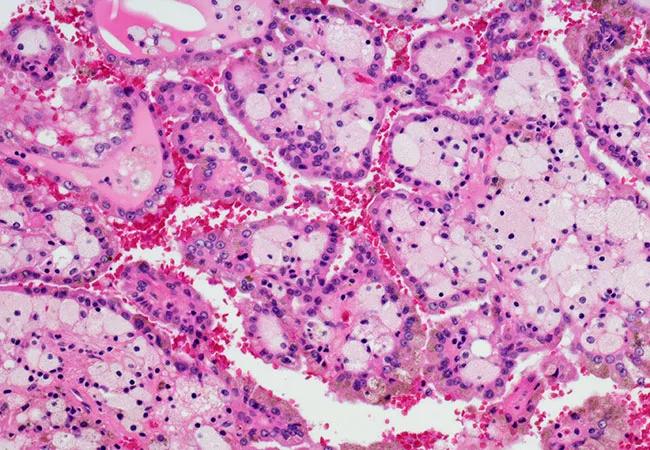Another option for immunotherapy

At the 2019 American Society of Clinical Oncology (ASCO) annual meeting, Cleveland Clinic genitourinary oncologist Brian Rini, MD, presented an analysis of select findings from the phase 3 KEYNOTE-426 trial of a renal cell carcinoma (RCC) therapy.
Advertisement
Cleveland Clinic is a non-profit academic medical center. Advertising on our site helps support our mission. We do not endorse non-Cleveland Clinic products or services. Policy
KEYNOTE-426 builds on the tremendous progress made in treating RCC over the past decade, leading to the current standard of care, immunotherapy. Based on its results, the U.S. Food and Drug Administration recently approved pembrolizumab (an immunotherapy agent) in combination with axitinib (an inhibitor of the VEGF receptor which leads to angiogenesis) for first-line treatment of advanced clear cell RCC. This is the second immunotherapy regimen approved in the past year. In 2018, ipilimumab/nivolumab was approved as a first-line treatment for International Metastatic Renal Cell Carcinoma Database Consortium (IMDC) intermediate- and poor-risk metastatic clear cell RCC patients.
The KEYNOTE-426 trial compared pembrolizumab plus axitinib with the previous standard of care, sunitinib (a tyrosine kinase inhibitor) in 861 patients with advanced clear cell RCC who had not received prior treatment for their metastatic kidney cancer. Patients were randomly assigned to receive either pembrolizumab (200 mg) intravenously every three weeks in combination with axitinib (5 mg) orally twice daily, or sunitinib (50 mg) orally once daily for four weeks followed by no treatment for two weeks.
The primary endpoints were overall survival (OS) and progression-free survival (PFS). A secondary endpoint was objective response rate (ORR). At a median of 12.8 months, KEYNOTE-426 found that:
Advertisement
“These are the best results we’ve seen for RCC in any trial,” says Dr. Rini, the lead KEYNOTE-426 investigator.
Following the initial KEYNOTE-426 results, Dr. Rini and the trial investigators analyzed outcomes in two subgroups: intermediate/poor risk and sarcomatoid features.
Of the 861 trial participants, 592 (68.8%) were IMDC intermediate/poor risk: 294 in the pembrolizumab plus axitinib group and 298 in the sunitinib group. Of the 578 participants with known status, 105 (18.2%) had sarcomatoid features: 51 in the pembrolizumab plus axitinib group and 54 in the sunitinib group.
Outcomes in the intermediate/poor-risk group:
Outcomes in the sarcomatoid features group:
The analysis also looked at depth of response for the entire cohort. Pembrolizumab plus axitinib demonstrated consistently more patients with tumor shrinkage, including three times as many patients with deep responses and 9% of patients with complete disappearance of all target lesions.
Advertisement
“This new regimen shows a consistent effect across all subgroups and gives us another effective option for treating RCC,” says Dr. Rini. “This regimen is now the standard of care in advanced RCC, with particular activity in patients with sarcomatoid features.”
Advertisement
Advertisement

Radiation therapy helped shrink hand nodules and improve functionality

Standard of care is linked to better outcomes, but disease recurrence and other risk factors often drive alternative approaches

Phase 1 study demonstrates immune response in three quarters of patients with triple-negative breast cancer

Multidisciplinary teams bring pathological and clinical expertise

Genetic variants exist irrespective of family history or other contributing factors

Study shows significantly reduced risk of mortality and disease complications in patients receiving GLP-1 agonists

Structured interventions enhance sleep, safety and caregiver resiliency in high-acuity units

Addressing rare disease and challenging treatment course in an active young patient